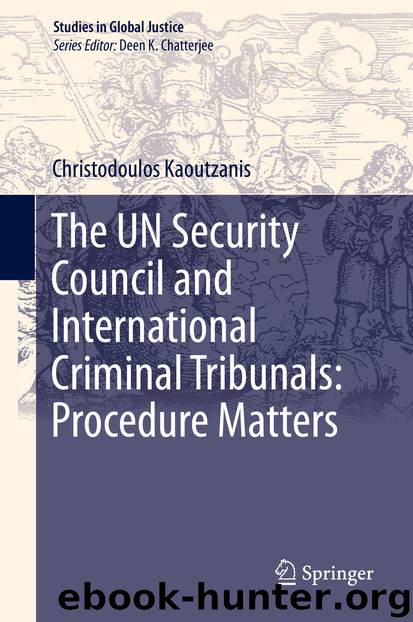The UN Security Council and International Criminal Tribunals: Procedure Matters by Christodoulos Kaoutzanis

Author:Christodoulos Kaoutzanis
Language: eng
Format: epub
ISBN: 9783030237776
Publisher: Springer International Publishing
5.3.3 Case Study of Discretion: United Kingdom and Foday Sankoh (After the Lomé Peace Accords)
The third case study of diplomatic activity took place after the signing of the Lomé Peace Accords and involved Jeremy Greenstock and Clare Short and the foreign policy apparatus of the U.K. government. Greenstock and Short used the discretion afforded to them as part of their official duties to evaluate and question the role assigned to RUF leader Foday Sankoh in the post-Lomé political system of Sierra Leone. Once again, this section provides the context for the events and then explains the debates among several high-ranking members of the Blair administration on the role Sankoh should have in Sierra Leone following the Lomé Peace Accords.
As described in Tony Blair’s memoirs, the United Kingdom did very little with regards to Sierra Leone’s civil war before 2000.77 In its early years in power, the Blair cabinet was focused on the international crises in the former Yugoslavia—particularly Kosovo—and the attempted inspections of Saddam Hussein’s WMD programs in Iraq. In 1999, once a large number of atrocities started receiving international attention, the United Kingdom slightly shifted its interest towards Sierra Leone. The Blair family had some personal ties to Sierra Leone, as Blair’s father had been a lecturer at the Sierra Leone University in Freetown.78 The United Kingdom also had colonial ties with that country, a reality that influenced the perception of U.K. policy-makers towards the civil war.79 These ties were so important that the BBC coverage remained the primary news media not only for the U.K. government, but also for all fighting parties in the civil war. More importantly, another former U.K. colony—Nigeria—had taken the lead in fighting the AFRC/RUF rebels. Mindful of the atrocities and of Nigeria’s financial difficulties in fighting this war, the Blair government decided to contribute £1 million to the logistical needs of ECOMOG forces in January 1999.80 By January 20, 1999, in its effort to bolster the anti-rebel front, the United Kingdom had also sent a frigate to Freetown.81 At the same time, however, Blair was also preparing for an air campaign against Serbia for the protection of Kosovar Albanians.
The contrast between the United Kingdom’s interest towards the war in Kosovo and general apathy towards Sierra Leone’s civil war could not have been starker. The double-standard was not lost on The Guardian, which reported that “[t]he UN’s consolidated humanitarian appeal for Kosovo is $690 m[illion], of which 58% has been met, while $2.1b[illio]n has just been pledged for regional reconstruction. A UN appeal for $25 m[illion] for Sierra Leone met profound international indifference and a mere 32% of the appeal has been covered.”82 Various commentators—such as the UN Human Rights Commissioner Mary Robinson—tried to galvanize the United Kingdom’s attention to Sierra Leone by noting that there were more atrocities in Sierra Leone than in Kosovo.
In contrast to its intervention in Kosovo, the United Kingdom favored a power-sharing agreement with the goal of national reconciliation for Sierra Leone. In July 1999, at the same time that U.
Download
This site does not store any files on its server. We only index and link to content provided by other sites. Please contact the content providers to delete copyright contents if any and email us, we'll remove relevant links or contents immediately.
| Arms Control | Diplomacy |
| Security | Trades & Tariffs |
| Treaties | African |
| Asian | Australian & Oceanian |
| Canadian | Caribbean & Latin American |
| European | Middle Eastern |
| Russian & Former Soviet Union |
The Secret History by Donna Tartt(19052)
The Social Justice Warrior Handbook by Lisa De Pasquale(12187)
Thirteen Reasons Why by Jay Asher(8893)
This Is How You Lose Her by Junot Diaz(6877)
Weapons of Math Destruction by Cathy O'Neil(6264)
Zero to One by Peter Thiel(5786)
Beartown by Fredrik Backman(5737)
The Myth of the Strong Leader by Archie Brown(5499)
The Fire Next Time by James Baldwin(5431)
How Democracies Die by Steven Levitsky & Daniel Ziblatt(5215)
Promise Me, Dad by Joe Biden(5141)
Stone's Rules by Roger Stone(5081)
A Higher Loyalty: Truth, Lies, and Leadership by James Comey(4954)
100 Deadly Skills by Clint Emerson(4921)
Rise and Kill First by Ronen Bergman(4779)
Secrecy World by Jake Bernstein(4741)
The David Icke Guide to the Global Conspiracy (and how to end it) by David Icke(4706)
The Farm by Tom Rob Smith(4502)
The Doomsday Machine by Daniel Ellsberg(4484)
